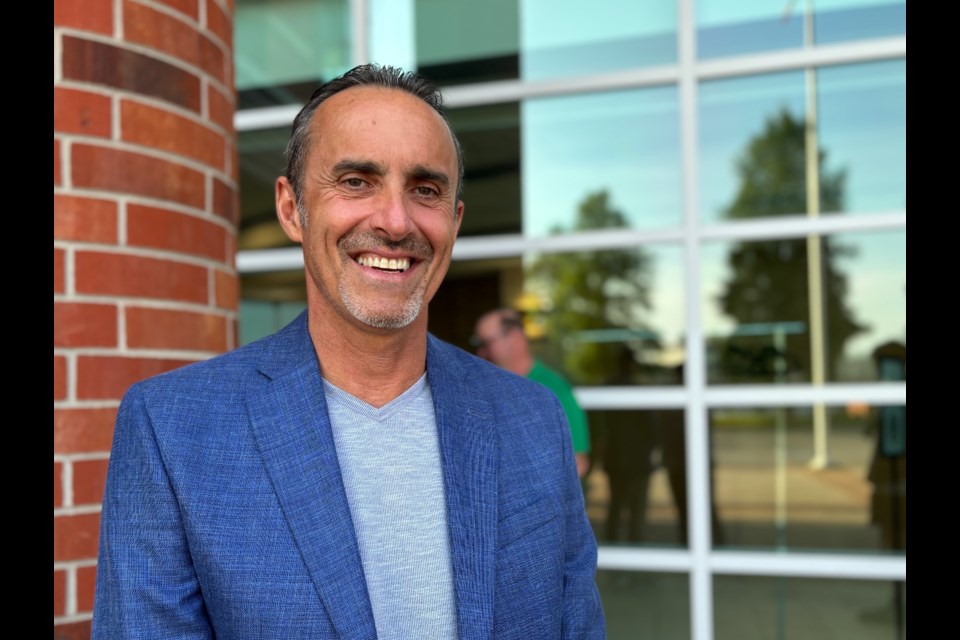Marcel Gery was destined to be an Olympian, but the political and bureaucratic barriers were insurmountable, until finally, after three Olympics had gone on without him, he found his window.
It was 1992 in Barcelona when at age 27, Gery finally competed in the Olympics after first achieving qualifying times with his butterfly stroke at age 15. And it wasn’t Czechoslovakia, the country of his birth, that he represented, but Canada.
With Jon Cleveland, Stephen Clark and Mark Tewksbury, Gery won a bronze for Canada in the 4×100-metre medley men’s relay. The new Canadian finally had his moment. And after all that time, it tasted sweet.
Gery, along with Milton Hart, Sandy Townsend and Grace Wong, is being inducted into the Aurora Sports Hall of Fame on Nov. 7. He was previously inducted into Swimming Canada’s Circle of Excellence and is also a member of the Ontario Aquatic Hall of Fame.
“To be recognized by your own community definitely is an incredible honour,” he says. “There are some phenomenal names as hall of famers in Aurora. Me, being…. part of that great group really means a lot. I’m grateful for that.”
Gery’s story as an athlete competing under a communist regime in the Eastern Bloc, his escape and how, as a Canadian, he finally made his Olympic dreams come true is extraordinary.
It began simply in swimming lessons as a young lad when he quickly showed aptitude in the pool. His parents wanted to make sure he had the skills necessary to keep him safe during trips to the cottage. The three-month long program was extended and Gerry found himself in the pool frequently as he strengthened as a swimmer.
“I was advancing really quickly and went into the big pool and starting swimming with kids who who were much bigger than me,” he recalls.
At age nine, he made his first national team for his age group.
In subsequent years as a junior swimmer competing on the European scene, Gery had the opportunity to see and experience life outside of his country. The absence of restrictions was striking.
“I started to form an opinion that life doesn’t have to be so grey and there’s no need for constant chaperones and the repression of being watched constantly,” he says.
By age 14, he was the youngest member of the country’s senior national team and his view of the world broadened. The following year Gery achieved Olympic qualifying times but the Czechoslovakian government determined he was too young and prevented him from going to Moscow. The 1980 Olympics was the subject of the largest boycott in Olympic history when several countries refused to send athletes in protest of the Soviet invasion of Afghanistan.
Gery continued to swim internationally, experiencing more of the world beyond the Czechoslovakian border and seeds of discontent were sewn. Thoughts of defection developed.
Los Angeles was set to host the 1984 summer Olympics. That was the year Gerry met the woman who would be his wife.
“That was the year I learned that Czechoslovakia was going to be part of the Eastern European countries that were not going to send their athletes to Los Angeles,” says Gery, who was disappointed for the second time.
Meanwhile Gery had connected with the coach of the North York Aquatic Club while competing at the U.S. Open in Austin, Texas and the idea of leaving Czechoslovakia took hold.
The following year he was married and Gery and his new wife, Michaela, decided they would leave Czechoslovakia, their families and everything they knew for a different life in the West. Gery said it was a very difficult decision, particularly for his wife leaving her family behind.
After the 1986 world championships in Spain, Gery returned home to get Michaela and the two said good bye to their families as they headed to what was then Yugoslavia, on what family members thought was a vacation.
The North York Aquatic Club sponsored the couple to come to Canada. Even with support from the minister of sport at the time, along with club members, Gery couldn’t secure citizenship in time to compete in the 1988 Olympics in Seoul. He was required to be in the country for three years if he wanted to represent Canada, even though he was ranked third in the world in butterfly and had a stellar career as an athlete.
“I had basically 12 years of competing on the world stage without the possibility of competing at the Olympics,” he says now. “I did stick around for another four years.”
It was then, in Barcelona as part of the relay team where he won that bronze medal. It was something of a relief, Gery says, to finally get to an Olympics. And having something to show for it “felt great.”
Gery swam for another year before retiring and he found a career in real estate. In 1996, he and Michaela moved to Aurora where they decided it was a good location to raise a family and convenient for Michaela’s career.
“We have been living working and playing in Aurora since then.”
Their two boys, now 30 and 34, participated in several sports, including swimming, which Gery helped to coach. And the Gerys are now grandparents.
“Marcel’s contributions extend beyond the pool. He has been an active member of the Aurora community, coaching his children’s sports teams and dedicating his time to various charitable causes. His efforts in raising funds for Southlake hospital, the Children’s Miracle Network, and the Canadian Breast Cancer Society have made a significant difference, showcasing his commitment to giving back and supporting those in need,” the Aurora Sports Hall of Fame wrote in announcing Gery as an inductee this year.
“Through his athletic achievements and community involvement, Marcel has exemplified excellence, dedication, and generosity, making him a cherished member of the Aurora community.”
